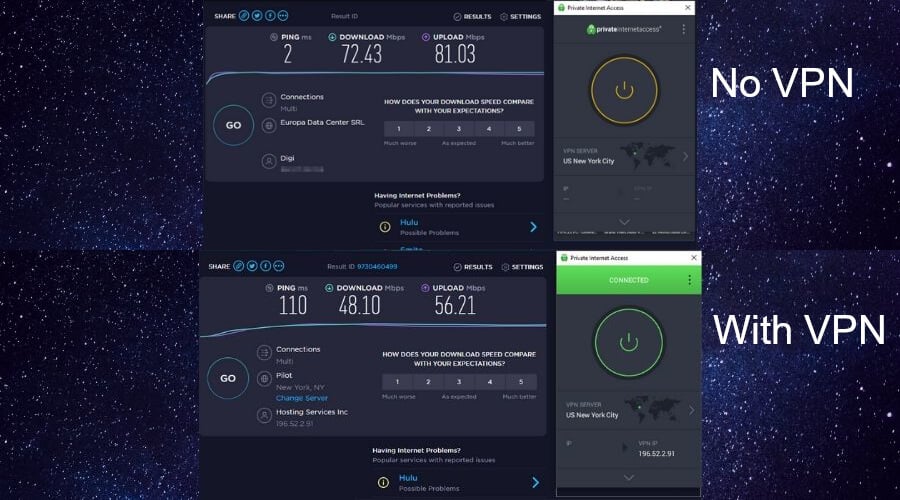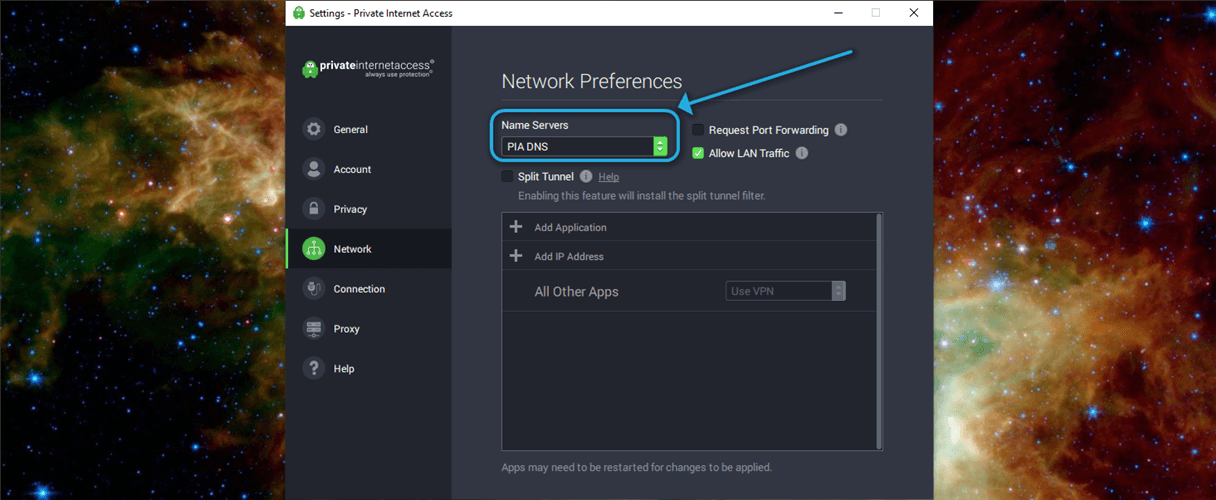Everyone knows and can agree that VPNs are among the best online privacy and security tools. Not to mention the fact that you can use them to circumvent geo-restrictions.
On paper, VPNs might sound like pure awesomeness, as they’re the multi-tool of the online privacy practitioner. However, a burning question still pops up every now and then in users’ minds: can VPN affect Internet speed?
How does VPN work?
Essentially, what a VPN does is hide your online activity and keeps it only for yourself. That we all know. But how about we take a look under the hood and understand how it can achieve that?
First thing first, a VPN is a network of servers that you can connect to, which will keep all your Internet traffic private. Picture your default, public Internet connection as a transparent tube that constantly passes data.
If your ISP, a hacker, government agency, or anybody else with the means to snoop on your activity, decided to take a peek, there would be nobody around to stop them. The data flows through the transparent tube and it’s there for anyone with eyes to see.
Now imagine that using a VPN would run a smaller, opaque tube, straight through the transparent one. While you’re using the VPN, all your traffic goes through the smaller, shielded tunnel, instead of floating around visibly.
Naturally, this means that your data becomes private, away from prying eyes. On the downside, since it’s the same amount of data running through a smaller tube, the flow might not be as fast.
Why does VPN slow down my Internet speed?
The brief analogy we used above misses some essential aspects. For starters, VPNs not only hide your traffic but also encrypt it. So even if someone would be able to take a glance at the traffic that passes through the obscured tunnel, it would be for nothing.
All your data is protected using complex encryption and decryption algorithms. This security measure also puts a strain on the servers, and implicitly on your Internet connection.
Then there’s the distance. Imagine that you need to access a website located in the US, and you’re already in the US. The time it takes for your computer to establish the connection shouldn’t be too long.
Slow VPN connection on Windows? Check our guide to see how to speed it up.
However, if you use a VPN server located in Germany, for instance, things change. Instead of drawing a straight line between you and the destination website, the connection hops through a Germany server, and the virtual distance between you and the website increases.
Last, but not least, your Internet speed might also depend on the quality of the VPN servers. If your VPN uses cheap, low-power servers, or if they throttle the bandwidth, your connection’s speed will decrease dramatically.
So, to sum it up, we could say that the main reasons for your VPN slowing down your Internet connections are:
- Encryption
- Distance
- Bandwidth limitation
- Poor quality servers
- Number of servers (more servers = less network congestion)
How to increase my Internet speed?
1. Use a trustworthy VPN
- Download Private Internet Access

- Install it and launch it on your PC
- Log into your account
- Connect to a fast, low-ping server (location isn’t important)
- Enjoy your fast, un-throttled Internet connection
Private Internet Access is an excellent all-round service from Kape Technologies. While it will still affect your Internet speed at times, depending on your server of choice and encryption algorithms you use, the slowdown will be negligible.

Private Internet Access
Is your VPN slowing down your Internet connection? Try PIA instead.
PIA has a wide network of servers all around the world, so you can be sure that you can always find the best server suited for your needs. This VPN also doesn’t throttle bandwidth, so you can enjoy unrestricted Internet access no matter where you are.
As you can see, the slowdown is not exactly huge, considering that we’re connected to a US server through wireless, from Europe.
2. Change your DNS
As you may know, your ISP assigns you a DNS address when you sign up for an Internet subscription. However, more often than not the ISP-assigned DNS is not the best and might slow down your Internet connection by a great deal.
If that’s the case, you can switch to a free DNS such as OpenDNS, Cloudflare, or Google Public DNS. This, in turn, can make your Internet connection faster.
Just as a quick side note: PIA has its own DNS that you can easily toggle straight from the client.
3. Use wired connections instead of wireless
If possible, you should always pick wired connections instead of wireless. Wired connections aren’t prone to interference, and as a result, you’ll get better speed and a more stable connection.
That goes especially if you’re also using a VPN. We already know that wireless is slower than wired and that VPN affects Wi-Fi connections. Put together, you get the worst of both worlds.
Can VPN affect Internet speed?
With all that in mind, we can safely say that yes, VPN does affect your Internet speed. However, you should keep in mind that the percentage of the slowdown is not a constant, and can wildly vary depending on various factors.
On the downside, you can’t do anything to remove the slowdown altogether.
The good news is that you can keep it in check by always choosing an efficient VPN service, choosing wired over wireless connections, using a public DNS if your ISP-assigned one is too slow, and connecting to fast servers that are close to you.
FAQ: Learn more about VPN affecting Internet speed
- Does having 2 routers increase Internet speed?
It depends on your current setup and Internet plan. If your connection is already slow, adding a second router will probably slow it down even further. However, sometimes adding a second router can improve your Wi-Fi speed, but don’t expect it to do wonders.
- Why does my VPN slow down my Internet speed?
A VPN can slow down your Internet speed for a number of reasons: encryption, decryption, the distance between you and the server, and the quality of the servers. A good VPN such as PIA can balance these parameters to provide you the best browsing experience.
- How to increase your Internet speed while using a VPN?
Try using wired connections instead of wireless, change your ISP-assigned DNS to a public one, and try choosing servers that are geographically close to you.
and
If you are looking for a cheap and genuine microsoft product key, warranty for 1 year.
It will be available at the link: https://officerambo.com/shop/
Microsoft Windows Embedded 8.1 Industry Pro : https://officerambo.com/product/windows-embedded-8-1/
Key Windows 7 Professional / Home Base / Home Premium (2 USER) : https://officerambo.com/product/key-windows-7/
Microsoft Windows 8.1 PRO (2 PC) : https://officerambo.com/product/microsoft-windows-8-1-pro/
Windows Server 2012 R2 : https://officerambo.com/product/windows-server-2012-r2/
Visual Studio Enterprise 2019 : https://officerambo.com/product/visual-studio-enterprise-2019/
Windows Server Standard / Datacenter / Essentials : https://officerambo.com/product/windows-server-all-version-standard-datacenter-essentials/
Microsoft Office Professional Plus for Windows : https://officerambo.com/product/microsoft-office-professional-plus-for-windows/
Microsoft Office Home and Student for Windows : https://officerambo.com/product/microsoft-office-home-and-student/
Key Microsoft Access 2016 : https://officerambo.com/product/key-microsoft-access-2016/
Microsoft Visio Professional : https://officerambo.com/product/microsoft-visio-professional/
Microsoft Project Professional : https://officerambo.com/product/microsoft-project-professional/
Account Microsoft Office 365 Profestional Plus 2020 Update For 5 Devices : https://officerambo.com/product/account-microsoft-office-365/
Key Microsoft Windows 10 Profestional / Profestional N : https://officerambo.com/product/key-microsoft-windows-10/
Key Microsoft Windows XP Pro : https://officerambo.com/product/key-microsoft-windows-xp-pro/
Microsoft Office Home and Business for Mac : https://officerambo.com/product/microsoft-office-home-and-business-for-mac/
No comments:
Post a Comment